Summary : Very present on the Southwest farms in France, foreign seasonal yet remain largely invisible, and almost never talk about their working conditions. Access to the rights is almost impossible for these workers which combine the factors of isolation, are … Continue reading
Category Archives: OUR CONTRIBUTIONS
Far from the European Eldorado, slavery in Lot-et-Garonne
Gallery
Summarize : The appeal trial of a farmer who employed Senegalese irregularly, making them work up to 13 hours a day without ever paying for them, testifies to the existence of situations close form modern slavery in our land. Yet … Continue reading
Another season linving in the streets?
Gallery
Summary : Last year, Sahrawi Spanish seasonal workers were expelled twice from their makeshift camps, while working day in Libourne vineyards. Both castles that appeal to service providers and have no direct contact with the seasonal, and public authorities are … Continue reading
Seasonal Migrants in agriculture: a “shot in the arm” for employers, rights stifled for workers.
Gallery
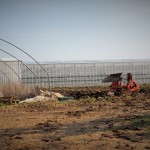
This gallery contains 2 photos.
Summary : In the Lot-et-Garonne department, the use of foreign seasonal workers – mainly Polish people – to meet the agricultural needs is widespread. For employers, they are a labor hardworking and flexible, unlike local job seekers. A priori, interests … Continue reading
Deadlocks of a society in crisis
Gallery
Summary: In the Andravida-Kyllini municipality, in 2014, it is a Greek citizen of Syrian origin who was elected mayor. The fact that he immigrated did not hinder his election, as, in the same time, Golden Dawn, fascist party of extreme … Continue reading
Cheap food has a cost for migrant and agency workers
Gallery
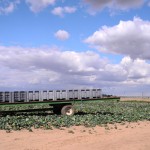
This gallery contains 1 photo.
The food sold in British supermarkets can be labelled either as ‘local’, ‘organic’, or even ‘fair trade’ when it comes from overseas countries, but no label guarantees that workers who produced, processed and packaged it in the UK enjoyed fair … Continue reading
Our flyers are available in English, French, Greek and Portuguese
Gallery
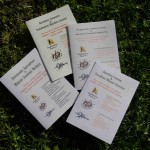
This gallery contains 1 photo.
Les plaquettes de présentation du programme sont disponibles en anglais, en français, en grec et en portugais. Our flyers are available in English, French, Greek and Portuguese. Os panfletos de apresantação do programa estão disponíveis em inglês, francês, griego e … Continue reading
Sam Scott: Challenge the climate of fear that workers face within the industry
Gallery
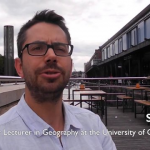
This gallery contains 1 photo.
Sam Scott is a Senior Lecturer in Geography at the University of Gloucestershire. He carried out two researches on forced labour for the Joseph Rowntree Foundation. In this interview, he comes back to his findings after interviewing over 60 migrant … Continue reading
(Français) Alentejo, “Un Capitalisme Sauvage”: Interview de Alberto Matos du Solidariedade Imigrante
Historiquement, l’Alentejo, au Sud du Portugal, est une région de latifundio et de salariés agricoles. En 2014, c’est encore tout à fait d’actualité, car le XXI siècle est aussi celui de l’esclavage moderne.
Aujourd’hui, beaucoup de travailleurs viennent de loin, notamment d’Europe de l’Est, pour tenter leur chance dans les immenses champs d’oliviers portugais. Trompés par les mafias, ils finissent par travailler sans salaire ni droits.
En finir avec l’exploitation impunie et faire respecter les droits des immigrants est la lutte de l’association Solidariedade Imigrante. Interview de Alberto matos du Solim de Beja.
Un mot sur Alberto Matos et le Solim (Solidariedade Imigrante):
Alberto Matos lutte depuis les années 70 pour la démocratie et contre le fascisme. Après avoir combattu la dictature de Salazar dans la clandestinité, il a continué de militer lors du retour de la démocratique, contre le fascisme, la xénophobie, le capitalisme et l’exploitation des travailleurs. Il a été candidat UDP (União Democrática Popular – Union Démocratique Populaire) à la présidence de 1996.
Il est aujourd’hui le responsable de la Délégation de Beja (Alentejo) de l’association Solidaridade Imigrante (« Solidarité Immigrant »). Cette dernière, créée en 2001, milite pour la défense des droits des immigrés au Portugal. Son fonctionnement particulier la rend totalement indépendante de la tutelle et des subventions gouvernementales. En effet, elle se finance entièrement par les cotisations des membres (à hauteur de 2€/mois). Refusant l’assistanat promu par les services sociaux étatiques, ce sont les migrants eux-même qui font tourner le Solim. Chaque personne ayant besoin d’aide peut décider de devenir membre et d’aider les autres à son tour. Et les portugais sont évidemment aussi les biens-venus.
Ce fonctionnement assure une réelle indépendance, responsabilisation, prise de pouvoir, prise de conscience politique des membres et permet de tisser des liens durables de solidarité et d’amitié entre les membres.
Attempts to improve agricultural seasonal labor conditions in Germany: the label “Faire Saisonarbeit”
Gallery
At the beginning of each crop season, the German media publish one or two reports on poor working conditions of seasonal workers in Germany. Given the negative impact these reports could have on all producers in the sector, IGBAU [1] … Continue reading
Between the prefabricated housing and asparagus fields ..
Summary:
Asparagus is a luxury vegetable very consumed in Germany, since 2003 she is the first producer in Europe. But the lack of a minimum wage applied to all professional sectors and the system of Minijob (short-term contracts, very few binding on the employer) causes many abuses of agricultural workers. The agricultural labor force employed in the collection of vegetables and fruits is almost essentially foreign. Polish Historically, there has been an influx of Romanians and Bulgarian recent years. Working conditions, hard because pickups techniques are often made worse by rights violations and lack of control tools.
The imposition of a minimum wage would be a first step towards more equality between national and foreign workers, but many blockages exist among employers. They fear not being able to withstand competition and pressure on prices, this is particularly true for those who sell their production outside of short circuits.
Temporary work agencies and migrant workers : for a flexible and cheap labor force
Gallery

This gallery contains 2 photos.
Summarize : We estimate that at least a 50% of labor force in the netherland is provided from temporary work agencies, majority of the workers come from Poland. Apparently it seems that there is very few labor violations, but in … Continue reading
Regulation of temporary work agency in the Netherlands
Gallery
Summarize : In order to fight against abuses, the governement is using a certification for the subcontracting firms respecting labor law and other criterias. These firms have to be registered in order to facilitate controls. The governement promised that if … Continue reading
In search of a better life: photographing migrant workers
Gallery
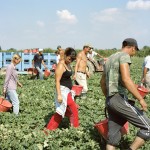
This gallery contains 7 photos.
Migrant workers today: they cut our meat, they take care of our seniors, they harvest our fruits and vegetables and build our homes. The province to major cities, Bulgaria, Poland or Romania to Germany: they leave their countries in hopes … Continue reading
The network Faire Mobilität a step towards improving the working conditions of workers posted to Germany
Gallery

This gallery contains 2 photos.
Summary: Faire Mobilität The program was set up to make them more equitable conditions of living and working in Germany, addressing specifically to migrant workers. The six centers Faire Mobilität operate in networks, embedded in local and national levels. The actions are … Continue reading

